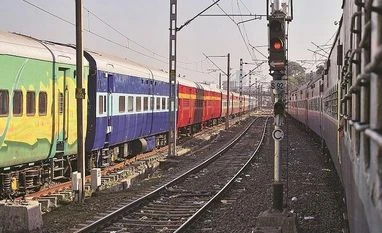To achieve the ambitious target of 100 per cent electrification by December 2023, the Indian Railways will have to electrify over 9,700 km annually for the next four years. However, the national transporter is unlikely to achieve this target as during the current year only 2,881 km or around 41 per cent of the Budget Estimate (BE) for 2019-20 was achieved till January this year.
So far, only 55 per cent of the railway track has been electrified. For 2020-21, too, the national transporter has set a target of only 6,000 km, which means the target will have to be raised in the coming years.
As of January this year, only about 58 per cent electrification has been achieved out of the total 93,902-km track length.
In its response to the parliamentary standing committee on the Railways, the ministry has said, “The pace which has been achieved in 2018-19 and 2019-20 shall be maintained in the coming years and the balance routes shall be commissioned by December 2023, positively.”
During 2018-19, the railways had achieved highest-ever 5,276 km electrification, which was 29 per cent more as compared to the previous year’s achievement of 4,087 km, but the pace has slackened in the current year.
The Railway Board has ensured the House Panel that it is taking various measures, including delegation of full powers to zonal railways for contract management, irrespective of the value of the contract.
In addition, more than Rs 100 crore contracts are now being executed on engineering procurement construction (EPC) mode for expeditious execution.
Despite a poor performance in electrification, track renewal seems to be heading towards an all-time high, as the railways laid 3,872 km of tracks till January this year, compared to 4,181 km of tracks renewed last year.
“During 2018-19, progress for track renewal for 4,181 km was achieved against a target of 4,400 km, which is 4.98 per cent less. The shortfall is mainly because of non-supply of full quantity of rails from SAIL to meet the physical target of through rail renewal (primary) set for the year,” the Railways said in its response to the panel.
During 2019-20, against proportionate target of track renewal for 3,250 track km up to January this year, a progress of 3,872 km has been achieved, which was 19 per cent more than the target.
The Railways said that to spend the available resources in a focused manner, the projects have been prioritised. Accordingly, 58 are super critical and 68 are critical projects.
The super critical projects are targeted for completion by December 2021 and critical projects by March 2024 and all other sanctioned doubling projects are targeted to be completed by March 2024.
The ministry further informed the panel that the conversion to broad gauge is around 2200 km. Barring around 800 km of heritage lines, the entire railway network would be converted to broad gauge by 2022-23.
Unlock 30+ premium stories daily hand-picked by our editors, across devices on browser and app.
Pick your 5 favourite companies, get a daily email with all news updates on them.
Full access to our intuitive epaper - clip, save, share articles from any device; newspaper archives from 2006.
Preferential invites to Business Standard events.
Curated newsletters on markets, personal finance, policy & politics, start-ups, technology, and more.
)